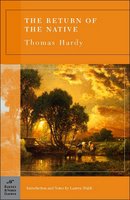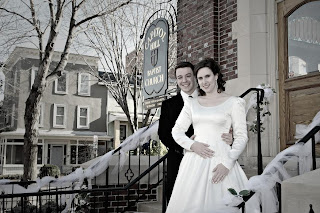Rereading: The Return of the Native
~ C. S. Lewis
 I first read The Return of the Native by Thomas Hardy in a college class on the British novel. I remember being somewhat bored by it -- most likely a combination of busyness (and so, a rushed reading) and the fact that we'd just completed Pride & Prejudice and Wuthering Heights (after that, Hardy didn't thrill me). But I've just read it again for the AP Literature course I teach; we'd been doing a unit on the land, reading O Pioneers, Cry the Beloved Country, and The Return of the Native. And this time around, I loved the novel.
I first read The Return of the Native by Thomas Hardy in a college class on the British novel. I remember being somewhat bored by it -- most likely a combination of busyness (and so, a rushed reading) and the fact that we'd just completed Pride & Prejudice and Wuthering Heights (after that, Hardy didn't thrill me). But I've just read it again for the AP Literature course I teach; we'd been doing a unit on the land, reading O Pioneers, Cry the Beloved Country, and The Return of the Native. And this time around, I loved the novel.Hardy nearly seamlessly blends together a modern novel with ancient tragedy. I don't remember being impacted by this feature in my first reading (even though my notes reveal that my professor did touch on the issue). For the character of Eustacia Vye, a woman the reader loves and hates at the same time, Hardy draws on the ancient goddesses with their combination of beauty, fierceness, and fickleness. For Clym Yeobright, he looks to the future, to the idea of the modern man. And yet it is Clym who must arrive at a very ancient understanding -- that to play with Fate is to doom oneself. The parallels between Clym and Oedipus (of Oedipus Rex, the play which Aristotle viewed as the ideal tragedy) are striking and in no way accidental. Blindness which leads to true sight, a mother, a lover, a return to a homeland -- they made for a good story then, and Hardy knows a good thing when he sees it. Hardy also loves the idea of Fate -- that impersonal, even vengeful, force that haphazardly rules the universe. In one of his poems, Hardy even wishes there were an evil god to blame, yet he cannot find one. All that remains is Fate.
And so, this novel raised an interesting question, which I posed to the class, and one which I continue to ponder. Is a modern novel particularly suited to draw upon the themes and elements of ancient tragedy?
I tend to think, yes. The modern tragic fall seems to be disillusionment, which Clym most certainly experiences, and which defines the characters of many modern novels (those written in the late 19th and early 20th centuries). And certainly the rejection of God, or at least the minimalization of God, creates space for Fate or some other force to fill the void. Without the framework of Christianity, we revert to paganism.
I think Hardy has written a good story (it's intriguing even if these issues are not considered) and at the same time has dealt significantly with essential issues of human experience. And that always makes for a good book. And one most certainly worth rereading.
P.S. I highly recommend this book. But if you've tried Hardy and have been put off by his somewhat depressing outlook, I'd suggest reading Far from the Madding Crowd, a novel that's considered to be more "cheerful." :-)


1 Comments:
Well, after reading this post, I have yet another book to add to my ever-growing "to be read" list. Maybe I can attempt to read this novel over Christmas break.
Post a Comment
<< Home